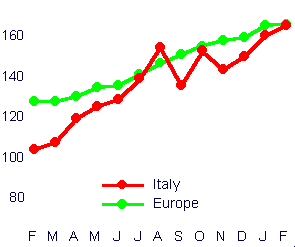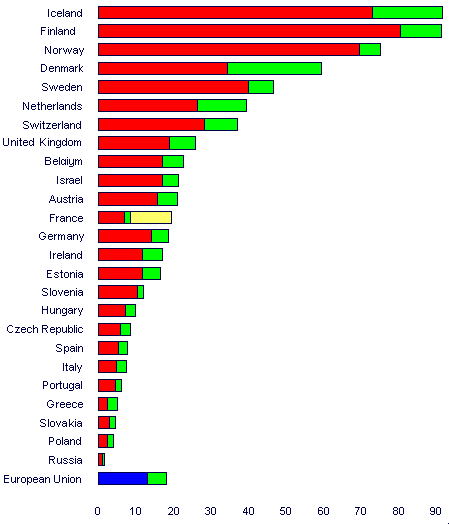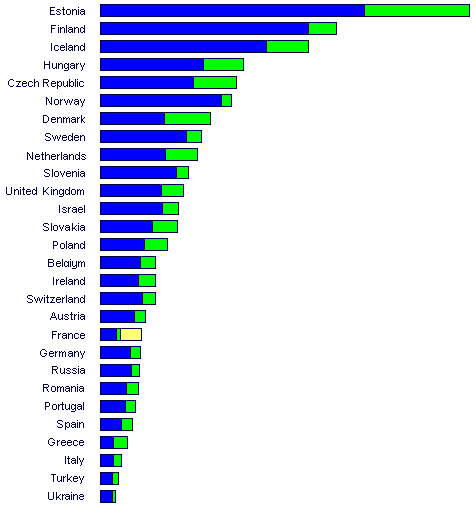 |
 |
1. Editorial: What is commerce? |
|
|
I often find that people and companies are quite confused about e-commerce. In my country, there are local reasons. Low and clumsy development of internet activity – and a problem of language. In economic theory, "commerce" is any transaction. But in common Italian use it tends to be understood as "selling". And e-commerce is generally seen as setting up a website to offer goods or services. Which, of course, is only one of many possible ways of using networks for business; and effective only if it's part of a broader plan and strategy.
But this is not only an Italian problem. Interestingly, in more advanced markets we hear more precise criticism of poorly planned marketing activity on the net.
I am pleased to quote again one of my favorite authors, Gerry McGovern. This is what he said in his article, Cash Registers , on February 15, 1999.
Cash registers are great. You get a cash register and you're in business. Cash registers are magic. They are a license for printing money.
Few question that the internet has suffered from its fair share of hype. The magical word that has been setting the fires burning over the last year or so is "ecommerce." For some, ecommerce has taken on almost religious connotations. Every time the word is mentioned, people stand back in awe.
Much of the surrounding language to ecommerce is very mechanical and functional. You get the impression that all you have to do is implement your database, your payment system and your customer tracking software, and you will have got your license to print money.
It's not like that, I'm afraid. In a traditional commerce setting you take for granted the cash register. If you go to a supermarket and the cash register isn't working, you'll become very frustrated. If you go again the next week and you find the same problem, then it is unlikely that you will return again.
Generally, however, choosing the supermarket or store you shop in is not down to what type of cash register they have. It's down to product range, customer service, value for money, etc.
Too much ecommerce and too many ecommerce vendors are focused on selling the benefits of the hardware and software. It's not about that. It's about marketing, sales, customer service. It's about offering the product the customer wants in the way they want it.
The internet is still a romantic, gambler's paradise, full of impossible promise.
........................................................
The internet is still a strange world. There are many who have turned it into a world of fantasy, where the first sign of reality is either jumped on or sends them running scared. "Ecommerce, ecommerce," is being sung like some mantra, the belief being that all you have to do is say the word enough and bucketfuls of money will flow.
It's not like that. I would bet that there are many ecommerce websites out there that are hurting in their attempt to deliver on the impossible promise. That's not to say that there isn't a business to be made on the internet. But it won't be made from cash registers and "ecommerce." It will be made just like it has always been made – from serving the customer.
|
That's the key point, I think. Service and customer care, not technique, is the heart of a successful competitive strategy; on the net as everywhere else.
Recent comments from two other authors, from quite different perspectives, point to the same conclusion.
back to top
|
 |
2. High tech - high touch (John Naisbitt) |
|
|
The high tech - high touch concept isn't new; it was defined by John Naisbitt in Megatrends in 1982. It's no coincidence that seventeen years later he is publishing a new book about this subject – High tech - high touch: the co-evolution of technology and culture. A long interview, published online by Blake Harris, is worth reading. Here are a few of John Naisbitt's interesting comments.
The introduction of new technology has always resulted in social change; that seems clear. The difference today is that, while technology has accelerated rapidly, social change has just not kept pace. There is an increasing gap between technological and social change, and it is this gap that is creating a problem.
It's like the yin and the yang. Technology and spirituality or technology and social change should be in balance, and they are not in balance today. The accelerated pace of technology is tipping the scale. So we seek instinctively and sometimes even desperately to regain our equilibrium. As a result, people feel a little left behind; they feel overwhelmed, even disoriented or alienated.
The onslaught of technology has inspired an unprecedented search for meaning, a yearning for community, a hunger for spirituality, a desire for deeper relationships, and really a desperate need to understand it all.
At the same time, technology itself is an integral part of the evolution of culture and the creative product, of course, of our imagination, our dreams and, indeed, our aspirations. But science and technology do not tell us what life means, so we examine and re-examine the nature of our humanity through family and community, through religion and spirituality, through the arts and literature – all things that fall on what I call the "High Touch Side."
We must all gain, I think, a renewed sensitivity to appropriate human scale, if we are to create and maintain healthy lives, healthy families, healthy businesses and a healthy world.
High Tech is about shortening time, about pushing everything towards realtime. High Touch is about taking time. High Tech is about the demand on the individual to produce more in less time. High Touch is about process, about allowing time for discovery.
...............................................
High touch is now playing a significant role in business. This should also apply to all organizations, including government.
High-tech organizations create an atmosphere, an environment, for personal growth. Personal growth is the key to success in the high-tech world. Gore is a billion-dollar company. They manufacture, amongst other things, Gore-Tex fabric. They maintain a very High Touch, family sort of atmosphere in all their plants. They limit the occupancy in any of their buildings to no more than 200 people, and their buildings are no more than six stories tall. At Gore, the scale is right; it is a human scale. With no more than 200 people in any plant, everyone can know everyone else, and everyone can know what everyone is contributing to the whole, in contrast to the 5000- or 10,000-person plant of the industrial world. Human scale was set aside in the industrial era, but we are getting back to it now. At Microsoft – on their campus, as they call it – there are no buildings taller than the tallest trees.
At the same time, interestingly, the office is getting more importance as a location. There have been a number of articles and books recently about how a lot of people would rather be at work than at home. Telecommuting, teleworking, I think, will continue to be a limited part of work because people generally want to be with people – hence, the hunger for community.
Relationships at work, given the duration of time, become deeper and richer. There is no place like the office.
The more technology we introduce into our society, the more people want to be with people – at movies, at rock concerts, shopping, in restaurants, at the office. For community, being with people, I take my definition from the theme song from Cheers – the line that goes, "A place where everyone knows your name." Like in the morning coffee diner. The internet cafe is fairly new and is fairly High Tech/ High Touch. And art is being delivered to individuals via the Internet. Yet, more and more people are going to museums. The numbers are increasing tremendously. People go to gallery exhibits for the shared experience of art.
After the invention of TV, and then big-screen TV and so forth, a lot of people predicted that there would soon be almost no movie theaters in the United States, but they didn't quite understand High Tech/High Touch. People do not go to a movie theater just to see a movie; they go to a movie to cry or laugh with 200 other people.
...............................................
Sometimes there are a lot of inappropriate uses of technology. One example is voice answering systems – "Your call is important to us. Please hold while we ignore it." – and those systems that branch out, push one to do this and push two to do that. Last year, Digital Equipment gave up its voice answering system because the company had gotten so many complaints about its automated information line: They hired 70 people to work the phones. Voice answering systems are anti-High Touch, anti-personalization in a High Tech world.
...............................................
High Tech is teleconferencing. High Touch is the handshake. High Tech is about upgrading machinery. High Touch is about educating people. Human resources are the competitive edge in this globalized world. When I was young, we measured a country's wealth by its natural resources and capital. First, Japan, and then other Asian countries, proved that a country did not need natural resources, and today capital is a global commodity, so the only thing left providing a competitive edge are human resources. Human resources absolutely are the competitive edge, so how we educate and train those human resources is the key determining factor of competitiveness.
...............................................
In today's modern world, all social change is the result of technological change. Success and survival in the new millennium will be determined by how well we understand the relationship and interplay between human beings' basic and emotional needs for High Touch and the working realities driven by high technology. Technology is simultaneously telling us human beings that we are less important and more important. And our success in business, government and relationships will depend on how well we can combine the elements of the human need for High Touch in a High Tech world. We must learn, I think, to balance the material wonders of technology with the spiritual demands of our human nature.
|
It will be interesting to read John Naisbitt's new book as soon as it's published (it will be available in October, 1999.) But one thing is clear. No matter which technology we use, we need to understand human values and relationships. This is especially true in the case of communication systems, and even more so on the internet.
back to top
|
 |
3. Strategy and technology (Michael
Porter) |
|
|
Michael Porter, the well known Harvard business administration professor, looks at things from a different angle. Interestingly, a report on his recent visit to Italy was published on March 1 by a technical magazine, Computerworld Italia. This is what he said about information technology (and the internet) at a meeting organized by Parametric Technology.
- Information technology, especially in the last 10-15 years, has a strong influence on organizations. But IT per se is not a strategy, as a merger is not a strategy: they are tools to support a company's strategy.
- The internet is a tool; it must not revolutionize strategies. A business must find a way of using the net that is unique and tailored to its strategic positioning.
- One of the big problems with IT is that
so far it has been used mostly to improve operating efficiency.
"They force us to adapt our way of doing business to their
processes, and this is very dangerous because it leads to
standardization and reduces the diversity of strategies."
Michael Porter commented also on the specific character of Italian companies.
- One of the historical reasons for the success of Italian companies is that, unlike companies in other countries, many of them instinctively developed around a strategic approach. They have a natural tendency to stick with a single product and a clear discipline in choosing where they want to compete.
- But we must be careful when we say that
they are successful because they are flexible. Flexibility per se
is not a strategy. "One thing is to say that I am flexible because
I stay close to my customers and my products can be easily
tailored to their needs. But it's quite different if I call myself
flexible because I can do a bit of this and a bit of that: so I am
not unique in any of my activities and I have a mediocre
positioning."
We may agree or not with Michael Porter's general management theories, but I find these comments very practical and to-the-point. Once again, the crucial fact is that technologies, and especially communication systems, must be driven by a clear and unique strategy. Standardization and imitation produce poor strategies and weak identities. Flexibility and dedication to customer service are winning assets, that can be enhanced by an appropriate use of the internet: but they must be used to strengthen, not to dilute, the company's unique style and personality.
back to top
|
 |
4. An update on
numbers |
|
|
February hostcount statistics by RIPE (Réseaux IP Européens) were published with unusual delay – on March 18. Italy seems to continue with somewhat faster growth than the European average, but not as fast as it should be to catch up with the more advanced countries.
Internet hosts in Italy and Europe
February 1998 – February 1999
(August 1997 = 100)
Analysis on data by RIPE Réseaux IP Européens

Italy seems to have regained the "peak" level, as a percentage of Europe, that it had in August, 1997. In the months to come we shall see if it begins to move further.
Now let's look at an update on density in Europe.
Internet hosts per 1000 inhabitants
in 25 countries in the Europe-Mediterranean area
Analysis on data by RIPE (Réseaux IP Européens) – countries with over 20,000 hosts and density above 1

The green slice of bars is growth in a year (February 1998 – February 1999).
The yellow slice of the bar for France is a rough estimate of the minitel factor.
We see some changes; the situation in France seems sowewhat uncertain, with growth not as fast as it appeared in past months; Italy is this period appears to be growing a bit faster than Spain; Greece has the fastest growth in the Mediterranean area.
In the next graph we see hostcount in relation to income.
Internet hosts in relation to income (GNP)
in 28 countries in the Europe-Mediterranean area
Analysis on data by RIPE (Réseaux IP Européens) – countries with over 20,000 hosts

As in the previous graph, the green slice of bars is growth in a year (February 1998 – February 1999).
The yellow slice of the bar for France is a rough estimate of the minitel factor.
In past issues we had seen this analysis only for the European Union. Here we notice some interesting facts, such as the internet strength (in proportion to GNP) of several Eastern European countries. If we don't consider minitel, France is the weakest country in Western Europe in internet use compared to income; the commitment of the French government to improve the situation doesn't seem, do far, to have achieved its objective.
back to top
|
 |
5. The awful spider |
|
|
When in the February 10 I discussed how some people think of the net as a cobweb, I had no idea that a few weeks later I would see such a grotesque example of that syndrome. This picture is a detail of a big cobweb that appeared a few days ago in an advertisement by Unisource in several Italian newspapers.

| This is a detail, to avoid a bandwidth overload. please click here – but please be patient: download may be a bit slow. |
The headline says If you are the spider, Unisource is the web. The copy is the usual, misleading hype about the wonders of "electronic commerce" and getting rich just by buying good connectivity. The picture is quite disgusting. A hairy monster, half spider, half human, with shark teeth, is leering at some flies caught in his web (the hapless insects are labeled "business").
I wonder what made Unisource present its services in such a disturbing manner. But what this picture reveals is a quite largely spread perception of the net as an unpleasant place – or something that we can make unpleasant for our customers. A few days before I saw this picture, I had written an article (to be published in the April issue of Web Marketing Tools) about some people and organizations thinking they can use the internet like a roach trap.
I wouldn't feel at all comfortable if I though that being on the internet meant running into that sort of monster. But I wouldn't feel at ease even if I put myself in the role of the spider. How could I succeed in an interactive and demanding environment by treating my customers like flies in a cobweb? How would I gain their trust by luring them into some sticky trap? And if that's Unisource's idea of marketing, would I be the first victim if I ventured into their net?
There is more harm in the way many suppliers offer their services than just bad taste in pictures. They make promises they can't keep. No wonder so many companies (and people) feel uncomfortable about the internet.
back to top
|
 |
6. Handcuffs |
|
|
Coincidence? Another unpleasant picture appeared in a full-page advertisement in major Italian newspapers between March 17 and 29. This time it's Microsoft, threatening computer dealers and users. It's a crime, says the headline, to install unregistered software. The statement is misleading: because under Italian law it's indeed (quite unreasonably) a criminal offense to sell unauthorized software – but not to install it or use it. Unless the music, film and software lobbies manage to have the law changed to make it worse.
This is the picture in the advertisement.

I wonder if such arrogance in upholding the enforcement of unfair contracts is wise. Microsoft continues to dominate the market, but there is mounting wave of opinion against cumbersome, inefficient and expensive software. Such arrogance is likely to cause even greater irritation.
And it's easy to read the handcuff symbol quite differently. We are, indeed, imprisoned by the Microsoft monopoly. Is that an irrevocable life sentence, or can we find a way of being free? Opensource software has come out of the closet and onto the front pages of even non-technical magazines and newspapers. Maybe liberation is on its way.
back to top
|
 |
7. The Melissa scare |
|
|
For over five years Italian mainstream media have been busy picking up every possible opportunity of making people uncomfortable about the internet. More so than in most other countries. That is probably the biggest single reason for the lack of internet development in our country.
They've been using all of the paraphernalia – pornography, child abuse, intruding hackers, maniacs of all sorts, thieves, spies, stolen credit card numbers, etcetera – and of course virus scares. Just as this issue of NetMarketing is going online, on March 29 Italy's leading newspaper has a front-page headline on the Melissa "macro virus" and several other papers carry dramatic articles on the same subject.
On other occasions even "serious" newspapers had published hoaxes as true. In this case the virus does exist (for details see Dave Murphy's report online on Itinfo) but it isn't as dangerous and harmful as they say. It uses the latest version of Microsoft Word to install a macro and Outlook Express to send out fake messages; we can't be infected if we don't use that software or if we are careful enough to avoid opening an unfamiliar attachment sent to us by someone we don't know. My favorite antivirus has already issued a tool to remove it. A pretty nasty joke, and a device that can clutter a company's mail system if not stopped in time. But not a "killer", as the newspapers call it. Anyone reading the press who isn't familiar with networking and information technology is under the impression that the internet is shattered by Melissa and she is destroying thousands of computers all over the world. I've heard of university professors asking "shall I be able to use e-mail any more?"
There is, indeed, a nasty and dangerous virus around. Poor information.
back to top
|
|